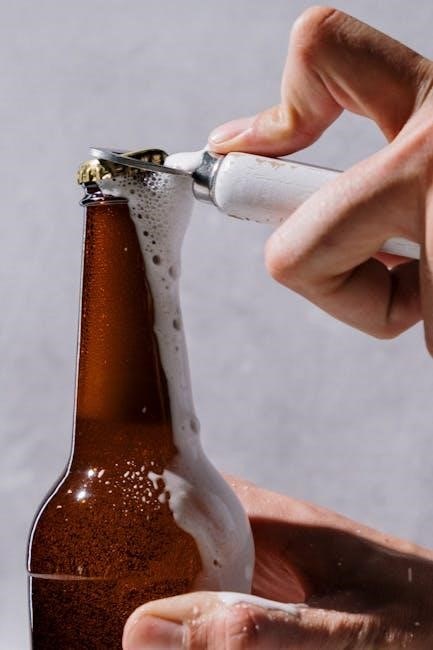Bartender Training Manual PDF: Essential Guide
Bartender Training Manuals are a globally required resource to launch your career in the hospitality industry. These PDF guides equip aspiring bartenders with essential knowledge, including customer service, equipment mastery, and mixology techniques.
Bartending is more than just mixing drinks; it’s a craft that blends customer service, technical skill, and responsible alcohol handling. This manual will guide you through the essentials, preparing you for a successful career behind the bar. We’ll cover everything from setting up your bar station and mastering mixology techniques to understanding different types of alcohol and providing exceptional customer experiences.
Whether you’re a beginner or looking to enhance your existing skills, this guide offers valuable insights and practical exercises. You’ll learn about the tools of the trade, proper pouring techniques, and the importance of maintaining a clean and safe working environment. Furthermore, this introduction will lay the foundation for responsible alcohol service, ensuring you prioritize the well-being of your patrons.

Core Bartending Skills
This section delves into the essential abilities needed to excel. It covers equipment handling, mixology, pouring techniques, and alcohol knowledge, forming the foundation for any successful bartender.
Essential Equipment and Bar Setup
A well-organized bar is crucial for efficient service. This section will outline the essential equipment every bartender needs, from shakers and strainers to jiggers and bar spoons. Understanding the purpose and proper use of each tool is paramount. Learn how to arrange your bar station for optimal workflow, ensuring quick access to frequently used items.
Efficient bar setup includes organizing glassware, stocking ice, and preparing garnishes. Mastering these organizational skills will allow bartenders to craft drinks swiftly. A well-stocked and properly arranged bar enables a bartender to handle high-volume periods with ease, enhancing customer satisfaction and minimizing waste.
Mixology Techniques and Pouring Skills
This segment focuses on the art of mixology, detailing essential techniques for creating balanced and flavorful cocktails. Learn the different methods of mixing, including shaking, stirring, muddling, and layering. Master the art of precise pouring, utilizing jiggers to ensure consistency and minimize waste. Different pouring styles, like free pouring, are also explored, emphasizing accuracy and control.
Understanding the importance of ingredient ratios and how they affect the final product is crucial. Learn how to adapt recipes to suit individual preferences and create signature drinks. Practice makes perfect, so dedicate time to refining your pouring skills.
Alcohol Knowledge: Types and Service
Developing a comprehensive understanding of different alcohol types is crucial for any bartender. This section will cover various spirits, including vodka, gin, rum, tequila, and whiskey, detailing their origins, production methods, and flavor profiles.
Learn about different types of wines, beers, and liqueurs, and how they are used in cocktails and served neat. Understanding the nuances of each alcohol type allows you to make informed recommendations to customers and create balanced drinks. Proper serving techniques, including glassware selection, chilling methods, and garnishing, will also be covered. This knowledge is vital for providing exceptional service.

Customer Service and Responsible Alcohol Service
Exceptional customer service and responsible alcohol service are paramount. This section focuses on providing outstanding experiences while adhering to legal and ethical standards for serving alcohol safely.
Customer Service Tips
Mastering customer service is essential for excelling as a bartender. Begin by greeting guests promptly and warmly, creating a welcoming atmosphere. Active listening is crucial; pay attention to their orders and preferences, ensuring accuracy and satisfaction. Offer recommendations based on their tastes, showcasing your knowledge and attentiveness.
Maintain a positive attitude, even during busy periods, as your demeanor impacts the overall customer experience. Handle complaints with grace and professionalism, seeking solutions to resolve issues effectively. Remember, building rapport with customers leads to repeat business and a thriving bar environment. Exceptional service is not just about serving drinks, it’s about creating memorable moments.
Responsible Alcohol Service
Serving alcohol responsibly is a paramount duty for every bartender. Always verify the age of patrons to prevent underage drinking, adhering strictly to legal requirements. Monitor alcohol consumption, recognizing signs of intoxication and intervening appropriately. Offer water and food to pace drinkers and encourage moderation.
Never serve alcohol to visibly intoxicated individuals, prioritizing their safety and the safety of others. Be prepared to refuse service politely but firmly, explaining the reasons behind your decision. Promote designated drivers and alternative transportation options to prevent impaired driving. Stay informed about local alcohol laws and regulations, ensuring compliance and minimizing liability.

Sanitation and Safety
Sanitation and safety are vital in maintaining a safe and hygienic bar environment. Implementing proper cleaning protocols and safety procedures protects both staff and customers from potential hazards.
Bar Sanitation Practices
Bar sanitation practices are crucial for preventing contamination and maintaining a clean environment. Regular cleaning schedules for all surfaces, including bar tops, counters, and equipment, are essential. Proper handling and storage of glassware and utensils minimize the risk of spreading germs. Implementing a system for waste disposal and recycling helps maintain a sanitary workspace.
Food safety protocols, such as proper handwashing techniques and temperature control, are essential. Regular cleaning of ice machines and proper storage of ingredients prevent contamination. Maintaining a pest control program safeguards against infestations. Regularly sanitizing high-touch areas such as door handles and menus reduces the spread of germs.
Adherence to these practices guarantees a safe and enjoyable environment for both employees and customers.
Safety Procedures in the Bar
Safety procedures in the bar are paramount to protect staff and patrons. Properly storing and handling chemicals minimizes the risk of accidents. Clear and unobstructed pathways ensure safe movement throughout the bar. Regularly inspecting and maintaining equipment prevents malfunctions and injuries.
Providing adequate lighting reduces the risk of slips, trips, and falls. Training staff on emergency procedures, including evacuation plans and first aid, prepares them to handle unforeseen situations. Implementing responsible alcohol service practices minimizes the likelihood of intoxication-related incidents. Monitoring customer behavior and intervening when necessary prevents conflicts and ensures a safe environment.
Adherence to these procedures promotes a secure and enjoyable atmosphere for everyone. Regularly reviewing and updating safety protocols ensures continued effectiveness.

Resources and Further Learning
Resources and Further Learning are crucial for continual growth in the bartending profession. Bartender training manuals, certification programs, and online courses provide opportunities to expand knowledge and skills in mixology.
Bartender Training Manuals and Guides
Bartender Training Manuals and Guides are essential resources for aspiring and experienced bartenders alike. These comprehensive guides offer a wealth of information, covering various aspects of the bartending profession. From essential equipment and bar setup to mixology techniques and pouring skills, these manuals provide a solid foundation for success.
Furthermore, they delve into alcohol knowledge, including types and service, as well as customer service and responsible alcohol service. Sanitation and safety protocols are also emphasized, ensuring a safe and hygienic work environment. Whether you’re a beginner or a seasoned pro, bartender training manuals and guides are invaluable tools for enhancing your skills and knowledge.
Certification and Training Programs
Certification and Training Programs offer structured learning paths for aspiring bartenders. These programs provide in-depth knowledge of bartending fundamentals, advanced mixology techniques, and responsible alcohol service. Completing a certification program can significantly enhance your career prospects, demonstrating your commitment to professionalism and expertise.
Many programs also include hands-on training, allowing you to practice your skills in a simulated bar environment. Additionally, some programs offer job placement assistance, connecting graduates with potential employers. Whether you’re looking to start a new career or advance your existing one, certification and training programs are valuable investments in your future as a bartender. Consider TIPS certification for responsible alcohol service.